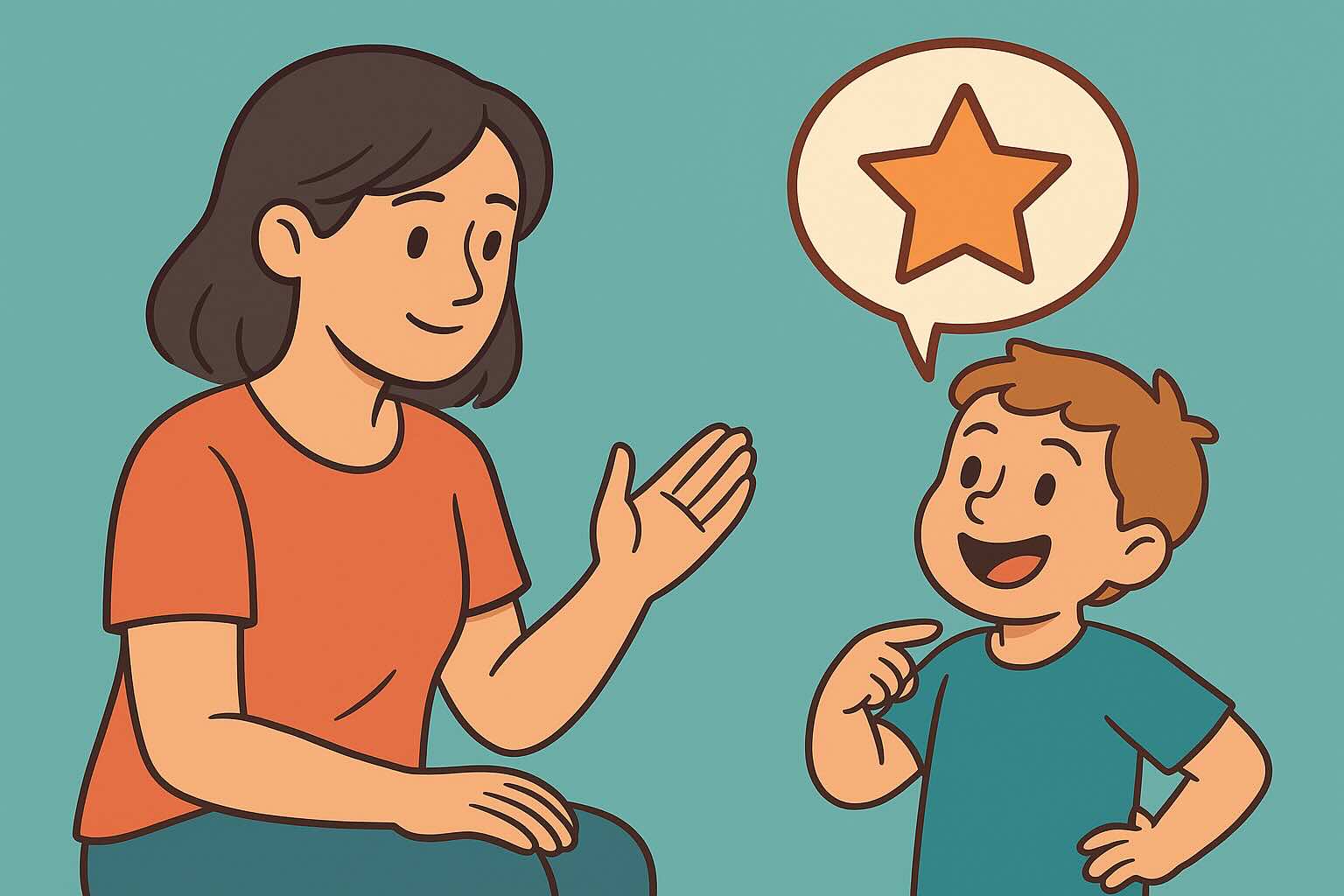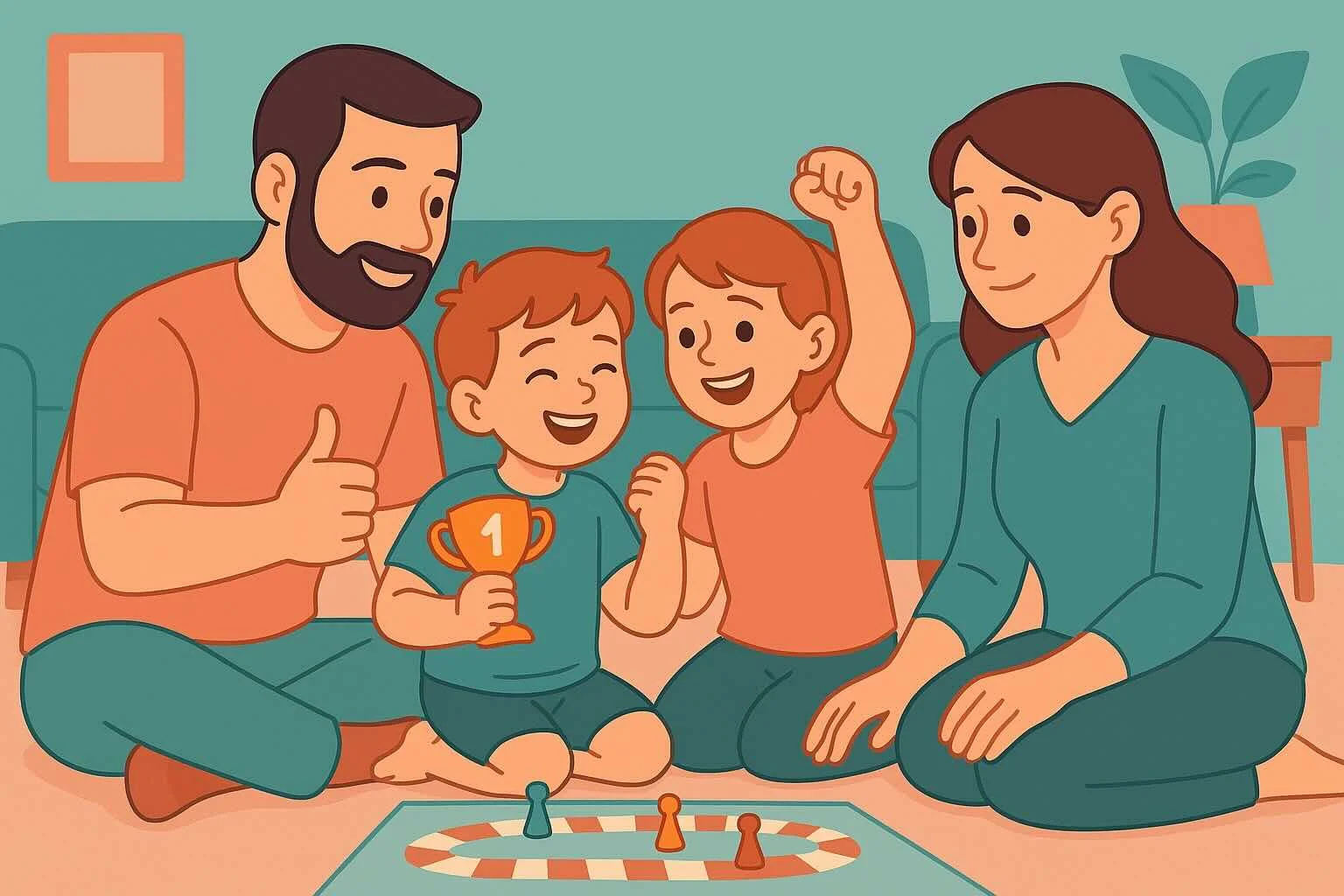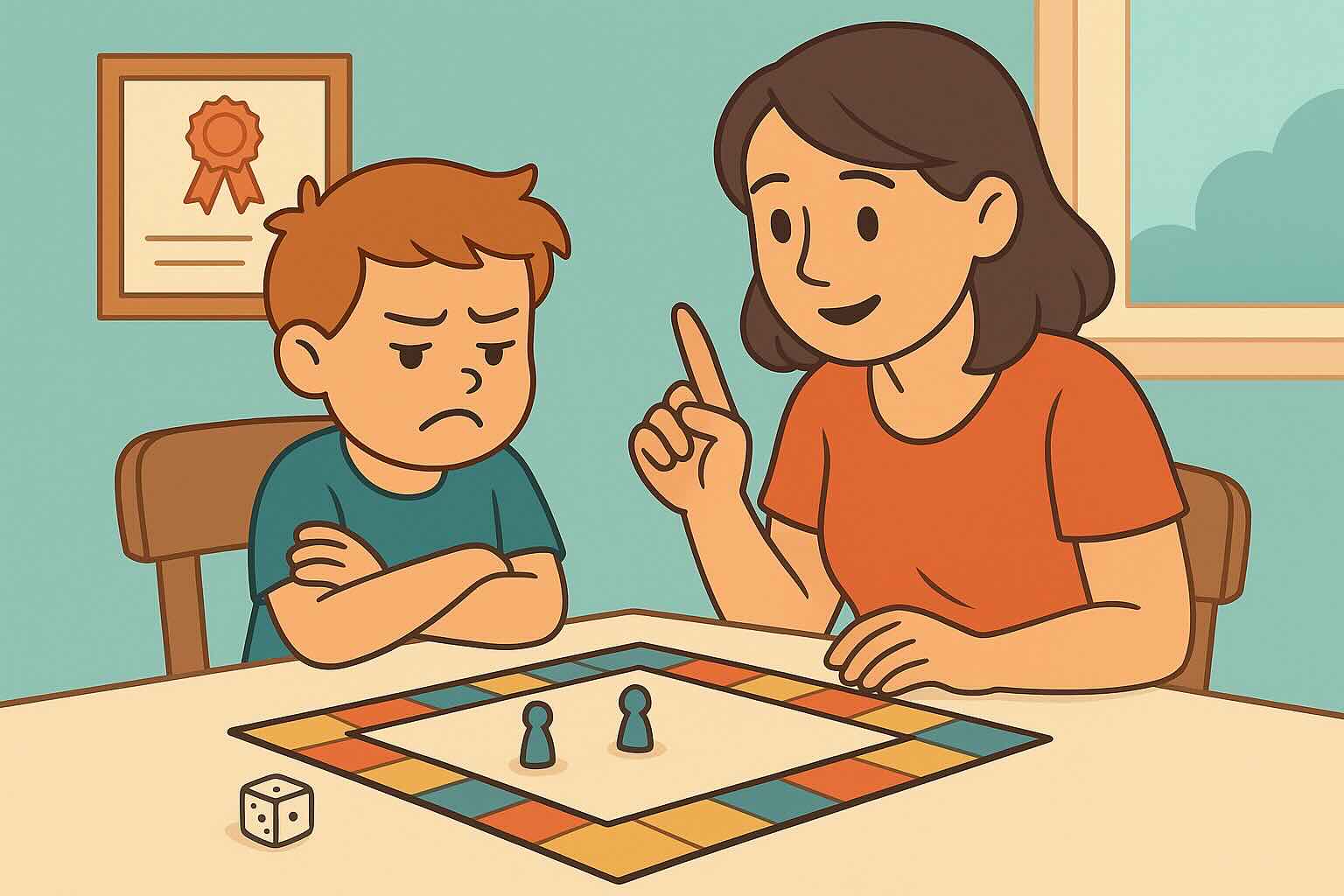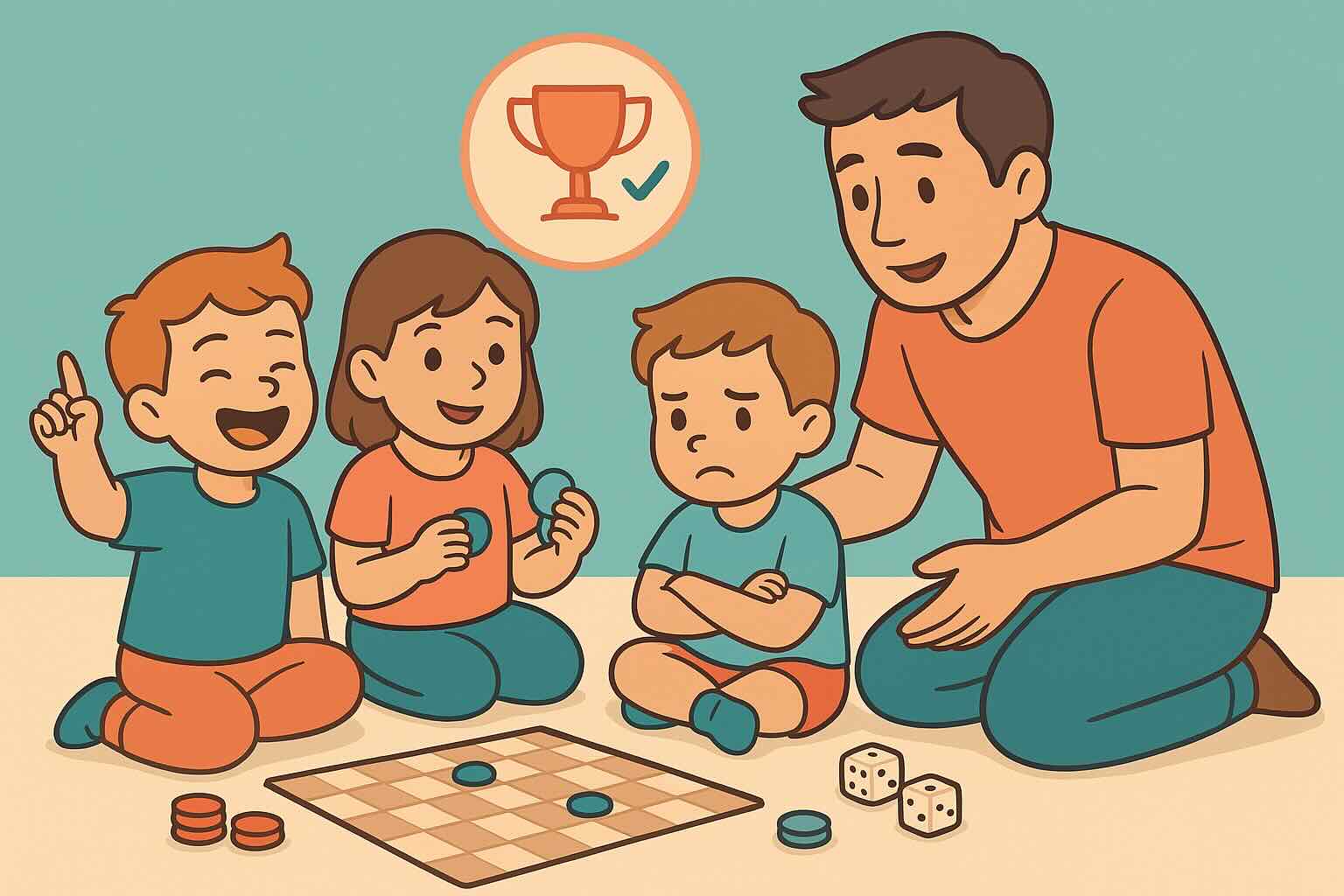Child Bragging: 4 Ways to Transform Boasting Into Genuine Confidence


If your child constantly announces "I'm the best at everything!" or puts down others to make themselves look good, you're dealing with problematic bragging behavior. While sharing accomplishments is healthy and normal, excessive bragging that hurts others' feelings or dominates conversations signals underlying emotional needs that require attention.
This comprehensive guide provides evidence-based strategies to help children ages 3-7 transform bragging into healthy self-expression. Learn to address the root causes while teaching social awareness, empathy, and genuine confidence-building.
For related challenges, also check out our guides on helping competitive children and teaching good sportsmanship. You may also find our guides on sibling teasing and social challenges helpful.
What You'll Learn in This Guide
- Understanding Bragging Behavior - Normal vs. problematic patterns and underlying causes
- The Hidden Emotions - Why bragging often masks insecurity rather than confidence
- The Awareness Method - Building self-reflection without shame or guilt
- Social Skills Development - Teaching empathy and appropriate sharing
- Family Strategies - Creating environments that support genuine self-esteem
- Age-Specific Approaches - Tailored techniques for different developmental stages
- Long-Term Success Stories - How families transformed bragging into balanced confidence
Estimated reading time: 11 minutes
Understanding Bragging: Normal Development vs. Problematic Patterns
What Is Bragging?
Bragging is sharing accomplishments in a way that makes others feel inferior or excluded. It's fundamentally different from healthy pride-sharing because it focuses on superiority rather than personal satisfaction or connection with others.
Healthy pride examples:
- "I scored a goal in soccer today!"
- "Look at the picture I drew!"
- "I helped my friend when they fell down."
Problematic bragging examples:
- "I'm better at soccer than everyone in my class."
- "My drawing is way better than yours."
- "I'm the smartest kid in the whole school."
Normal Developmental Bragging (Ages 3-7)
Some bragging is completely normal as children develop:
Ages 3-4: Basic pride and excitement about accomplishments
- Often lacks social awareness about impact on others
- Usually focused on immediate achievements
- Easily redirected with gentle guidance
Ages 5-6: Peak bragging period as social comparison develops
- Beginning to understand relative performance
- Testing social hierarchies and their place in them
- More intentional but still developing empathy
Ages 7+: More sophisticated understanding of social impact
- Can begin to understand others' perspectives
- Capable of more complex conversations about feelings
- Ready for advanced empathy and social skills development
When Bragging Becomes Problematic
Red flags that indicate excessive bragging:
- Constant need to be "the best" at everything
- Putting others down to elevate themselves
- Unable to celebrate others' accomplishments
- Bragging interferes with friendships for over 6-8 weeks
- Extreme reactions when someone else succeeds
- Bragging occurs even in inappropriate situations
- Child seems unable to enjoy activities without being superior
The Hidden Emotions Behind Excessive Bragging
Bragging Often Masks Insecurity
Counter-intuitive truth: Children who brag excessively often feel the opposite of confident. Think about it—truly confident people don't need to constantly prove their superiority. Excessive bragging usually points to:
- Feeling inferior or "not good enough"
- Jealousy of others' abilities or attention
- Needing external validation for self-worth
- Anxiety about their place in social groups
- Unmet needs for recognition or attention
The Three Main Emotional Drivers
1. Unmet Need for Recognition Some children brag because they're not receiving enough positive attention for their efforts and accomplishments. They've learned that bragging gets a reaction—even negative attention feels better than being ignored.
2. Comparison and Jealousy Around age 5, children naturally begin comparing themselves to others. Some become stuck in competitive comparison mode, feeling that others' successes somehow diminish their own worth.
3. Perfectionism and Fear of Failure Some children brag preemptively to avoid the vulnerability of possibly not being the best. If they establish superiority verbally first, they feel safer from potential criticism or failure.
The Awareness Method: Building Self-Reflection Without Shame
Traditional approaches that don't work:
- "Stop bragging—it's not nice."
- "You're going to lose friends if you keep boasting."
- "Be more humble."
- "Don't be so full of yourself."
Why these approaches fail: They use shame and guilt to modify behavior without addressing underlying emotions. They also don't teach children what TO do instead.
Step 1: Connect Through Understanding
Start conversations during calm moments with validation and curiosity:
"I've been noticing something about you. You're really good at [specific skill], and you love to tell people about how good you are. It makes sense that you want to share that—it probably feels really good to be good at something."
Key principles:
- Start with something genuinely positive
- Acknowledge their accomplishments
- Validate the desire to share successes
- Use a curious, non-judgmental tone
Step 2: Build Awareness Through Gentle Inquiry
"I've noticed that when you tell your friends you're the best at soccer, sometimes they seem to feel sad or left out. Have you noticed that? What do you think happens when you tell someone you're better than them at something?"
Focus on social impact, not character judgment:
- Ask about their observations of others' reactions
- Help them connect their words to others' feelings
- Avoid labeling the behavior as "bad" or "wrong"
- Encourage their own problem-solving
Step 3: Explore Alternative Approaches
"It's totally okay to feel proud and want to share when you're good at something. Let's think about ways to share that feel good for both you and your friends. How could you tell someone about your soccer skills in a way that doesn't make them feel bad?"
Guide them toward:
- Asking others about their interests and skills
- Sharing experiences rather than just superiority
- Including others in their excitement
- Celebrating effort alongside achievement
Step 4: Practice New Approaches Through Role-Play
"Let's practice different ways to share good news. Pretend I just scored a goal in soccer. I could say 'I'm better than everyone else' or I could say 'I scored a goal and I'm so excited!' Which one would make you feel better if you were my friend?"
Make it interactive and fun:
- Take turns practicing both "old" and "new" ways
- Laugh together about the difference
- Let them teach you better approaches
- Practice in safe, family contexts first
Teaching Social Awareness and Empathy
The "Multiple Truths" Concept
Help your child understand that multiple people can be good at things simultaneously:
"Here's something really cool to think about: When your friend is good at something, it doesn't take away from what you're good at. You can both be good at soccer. You can both be smart. There's enough 'good' for everyone."
Reinforce this concept through:
- Family discussions about everyone's different strengths
- Celebrating others' accomplishments together
- Pointing out examples in daily life
- Books and stories that highlight multiple characters' abilities
Building Genuine Interest in Others
Transform self-focused bragging into genuine social connection:
Instead of: "I'm the fastest runner in my class." Teach: "I love running! Do you like to run too? What's your favorite way to exercise?"
Practice scripts:
- "Tell me about something you're working on."
- "What's something you're proud of?"
- "I like [activity]. Do you like it too?"
- "You seem really good at that. How did you learn?"
The Celebration vs. Comparison Framework
Celebration language:
- "I'm proud of myself for..."
- "I worked really hard and..."
- "I felt so excited when..."
- "I love doing..."
Comparison language to avoid:
- "I'm better than..."
- "Everyone else is worse at..."
- "Nobody can beat me at..."
- "I'm the only one who..."
Age-Specific Strategies for Addressing Bragging
Ages 3-4: Building Basic Social Awareness
At this age, focus on simple cause-and-effect understanding about feelings:
Strategies that work:
- Use emotion words consistently ("proud," "excited," "hurt")
- Point out others' facial expressions and body language
- Practice taking turns in conversations
- Model inclusive language during family interactions
- Keep explanations simple and concrete
Script examples:
- "When you say you're better, look at Jamie's face. See how sad they look?"
- "Let's ask daddy what he's proud of too."
- "We're both good at puzzles! Isn't that fun?"
Ages 5-6: Developing Empathy and Perspective-Taking
Children this age can begin to understand how others feel and why:
Strategies that work:
- Discuss characters' feelings in books and movies
- Practice "how would you feel if..." scenarios
- Introduce the concept of different types of intelligence/abilities
- Help them identify their own feelings when others brag
- Use family meetings to discuss feelings and social situations
Script examples:
- "How do you think Marcus felt when you said you were smarter than him?"
- "Remember when Sophie said she was better at art than you? How did that feel?"
- "What's a way to share your excitement that would make others feel included?"
Ages 7+: Advanced Social Skills and Self-Regulation
Older children can handle more complex concepts about relationships and self-esteem:
Strategies that work:
- Discuss the difference between internal and external motivation
- Explore the concept of growth mindset vs. fixed abilities
- Help them develop personal goals beyond comparison
- Practice advanced conversation skills and active listening
- Begin discussing the impact of social media and comparison culture
Script examples:
- "What makes you feel proud of yourself even when no one else knows about it?"
- "How do you think bragging affects your friendships over time?"
- "What's something you enjoy doing even if you're not the best at it?"
Family Strategies: Creating an Environment for Healthy Self-Esteem
Reframe Success and Achievement
Focus on process over outcomes:
- "Tell me about how you practiced for that test."
- "What was the most challenging part of that project?"
- "How did it feel when you kept trying even though it was hard?"
- "What did you learn about yourself while doing that?"
Celebrate character alongside achievement:
- "I loved seeing how you helped your teammate."
- "You showed real persistence when that got difficult."
- "I noticed how kind you were to the new student."
- "You showed great problem-solving skills."
Model Balanced Self-Expression
Your children learn more from watching you than from anything you say:
When you succeed:
- "I'm proud of how hard I worked on that project."
- "That felt really good! I've been practicing for a while."
- "I was nervous, but I'm glad I tried my best."
When others succeed:
- "Congratulations! You must be so proud."
- "That's wonderful! Tell me how you did that."
- "I can see how happy you are about that accomplishment."
Family Discussions That Build Perspective
Weekly family sharing circles:
- "Let's each share something we're proud of and something we're still working on."
- "Who can tell about a time they felt jealous this week? How did they handle it?"
- "What's something each family member is really good at?"
- "Let's each share about someone else we admire and why."
Create family traditions around others' success:
- Celebrate friends' and family members' achievements
- Write thank-you notes to people who help your family
- Discuss community helpers and different types of important work
- Share stories of people who succeeded through effort and kindness
Realistic Expectations: What Change Looks Like
Timeline for Improvement
Weeks 1-2: Awareness Building
- Begin having conversations about bragging during calm moments
- Your child may not immediately see the problem with their behavior
- Focus on building awareness without expecting behavior change
- You might notice increased resistance to the topic initially
Weeks 3-4: Beginning Integration
- Start seeing occasional moments of social awareness
- Your child might catch themselves mid-brag sometimes
- Expect inconsistency—good moments followed by regression
- Continue having regular conversations and role-playing
Weeks 5-8: Noticeable Progress
- More frequent use of inclusive language
- Beginning to ask others about their interests/achievements
- Faster self-correction when they slip into bragging patterns
- Others may start commenting on improved social interactions
Months 3-6: Solid Integration
- Generally more balanced approach to sharing accomplishments
- Genuine interest in others' experiences and achievements
- Improved friendships and social connections
- Increased genuine self-confidence alongside decreased bragging
What Success Actually Looks Like
Success does NOT mean:
- Your child never feels proud or excited about achievements
- They become overly modest or self-deprecating
- They stop sharing accomplishments entirely
- All bragging disappears immediately
Success DOES mean:
- More inclusive way of sharing successes
- Genuine interest in others' accomplishments
- Better social connections and friendships
- Decreased need for external validation
- Increased empathy and social awareness
When to Seek Professional Help
Warning Signs That Warrant Professional Support
- Bragging behavior significantly impacting friendships for over 3 months
- Extreme reactions when others receive attention or praise
- Persistent inability to celebrate others' successes
- Bragging combined with aggressive behavior toward peers
- Child expresses persistent negative feelings about themselves despite bragging
- Family relationships significantly strained by bragging behavior
- Bragging interferes with school or social group participation
- Underlying anxiety, depression, or other mental health concerns
Types of Professional Support
Child psychologists can help with underlying self-esteem issues, anxiety, or emotional regulation challenges
School counselors can provide support for social skills development and peer relationship issues
Family therapists can assist with family dynamics that may contribute to attention-seeking behaviors
Social skills groups provide structured practice with peers in supervised settings
Real-Life Success Stories
Kai's Story: From Constant Bragging to Genuine Connection
"Kai used to dominate every conversation with how good he was at various things. Playdates became uncomfortable because he'd put other kids down to make himself look better. We started having regular conversations about how his words affected others, and practiced asking friends about their interests. We also made sure to give him plenty of positive attention for effort and character, not just achievements. It took about 2 months, but now he's genuinely interested in what others are good at, and his friendships have improved dramatically. He still feels proud of his accomplishments, but he expresses it in ways that include others rather than exclude them."
Maya's Story: Overcoming Sibling Competition
"Maya constantly bragged about being better than her younger brother at everything. It was creating real tension between them and making family activities stressful. We realized she was feeling insecure about her place in the family and worried we loved her brother more. We started having individual conversations with her about her feelings, practiced celebrating her brother's accomplishments together, and made sure she got one-on-one attention regularly. The change took about 6 weeks, but now she actually helps her brother and celebrates his successes. She learned that supporting others doesn't diminish her own worth."
David's Story: Building Internal Motivation
"David seemed to need constant praise and was always announcing how smart or talented he was. We realized he was depending entirely on external validation for his self-worth. We started focusing on his internal experiences: how things felt to him, what he enjoyed about activities beyond just being good at them, and what he was curious about. We also practiced family discussions where everyone shared struggles alongside successes. Over about 3 months, he developed genuine internal motivation and stopped needing to constantly prove his superiority to others."
Your 8-Week Action Plan for Addressing Bragging
Weeks 1-2: Understanding and Connection
- Have 2-3 calm conversations about sharing accomplishments
- Observe when and why your child brags most frequently
- Start noticing your own responses to their bragging
- Begin using empathy-building language during daily interactions
Weeks 3-4: Building Awareness
- Help your child notice others' reactions to bragging
- Practice identifying emotions (theirs and others')
- Begin role-playing different ways to share news
- Start family discussions about different types of strengths
Weeks 5-6: Active Skill Building
- Practice "inclusive sharing" language regularly
- Encourage questions about others' interests and achievements
- Celebrate effort and character alongside achievements
- Model balanced self-expression in your own interactions
Weeks 7-8: Integration and Independence
- Encourage self-correction when bragging occurs
- Support genuine social connections with peers
- Continue family discussions about empathy and relationships
- Reinforce progress while maintaining expectations
Building Long-Term Emotional Intelligence Through Balanced Self-Expression
The Bigger Picture: Confidence vs. Superiority
Help your child understand the difference between healthy confidence and problematic superiority:
Healthy confidence:
- Feeling good about effort and improvement
- Sharing excitement without comparing to others
- Trying new things despite risk of not being the best
- Supporting others' successes genuinely
Problematic superiority:
- Needing to be better than others to feel good
- Putting others down to elevate themselves
- Avoiding activities where they might not excel
- Feeling threatened by others' accomplishments
Teaching Intrinsic vs. Extrinsic Motivation
Help your child find internal reasons for activities:
- "What do you love about playing piano, even when no one is listening?"
- "How does it feel inside when you help someone?"
- "What's interesting to you about building with blocks?"
- "Tell me about a time you felt proud of yourself even though no one else knew."
Key Takeaways: Transforming Bragging into Healthy Self-Expression
- ✅ Excessive bragging often masks insecurity rather than indicating genuine confidence
- ✅ Address underlying emotional needs while teaching social skills
- ✅ Use awareness-building conversations during calm moments, not in-the-moment corrections
- ✅ Teach inclusive sharing rather than just stopping bragging behavior
- ✅ Model balanced self-expression through your own behavior
- ✅ Focus on effort and character alongside achievement celebration
- ✅ Expect gradual improvement over 6-8 weeks with consistent approach
- ✅ Build genuine empathy through perspective-taking practice
- ✅ Create family environments that support intrinsic motivation and genuine connection
Remember: The goal isn't to eliminate your child's pride in their accomplishments, but to help them share that pride in ways that build connections rather than create distance from others. With patience and consistent guidance, bragging can transform into genuine confidence and social awareness.
This article is based on developmental psychology research and social skills intervention strategies. Individual results vary based on child temperament, family dynamics, and consistency of implementation. Consult with a child psychologist if bragging behaviors significantly impact social functioning or seem connected to other emotional concerns.
24/7 AI Parenting Assistant
Get instant, personalized advice with expert-curated parenting knowledge. Chat with your AI coach anytime, anywhere.

Competitive Child Toolkit
Complete guide to managing winning and losing with preparation scripts, reflection methods, and age-specific strategies.
Frequently Asked Questions
Need personalized support?
RootWise's AI coach can provide tailored strategies for your specific situation, available 24/7 when you need it most.
Learn More About AI Coaching →



